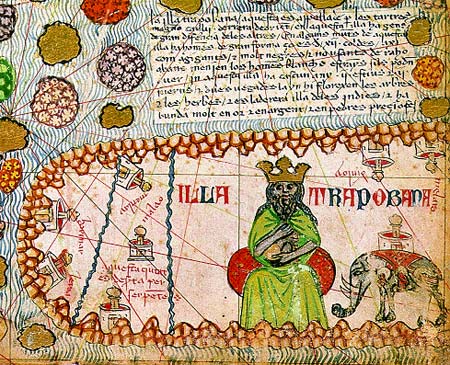He who will know more of these stones, their virtues and their characters,
let him read the Lapidary, which is compiled from science;
here I will treat of them no more; I will begin of a stone,
which is the foundation, light, and support of them all;
I will treat of this stone; now may God be at the beginning of it!
Unio is the name of this stone [the pearl], none can be more precious;
therefore it is named unio, the equal of it was never found.
And now I will tell rightly how it grows where we find it.

Detail showing "Illa Taprobana", from the Catalan Atlas (1375) created by Mallorcan cartographer, Abraham Cresques (1325-1387).
The unio grows by great right in an isle named Tapné [legendary Taprobane known for its pearls; assumed to be modern
day Sri Lanka]
in that isle are such stones, that are made in such manner,
that there is neither mouth nor juncture nor hole nor crevice,
but they are smooth as ice, I wish you to know that,
these stones have the power to open at their own will,
they receive the dew of heaven, become impregnated with it, and live by it,
as if they were living creatures, then become again without shapes;
the dew is so long in the stone, that the dew becomes stone,
and it is there always as long as the mother carries her child
then it opens itself, it issues from the stone, and they join in such manner,
that never after shall it be unclosed, nor will there be found a crack in it.
In a book of science, which we call Bestiary, it is said
that this stone grows in the sea, which it directs us to call a little shell,
it is above the sea in the morning, and there it receives the dew;
it will inclose the dew in itself, and afterwards will go down to the bottom of the sea,
as long as the dew shall be in it it will appear half flesh;
and the dew will be there so long till it be turned into stone.
This stone is good to be carried by one who can keep himself chaste;
for him who can have this stone, it will be of force against many things.
There will never be any infirmity, except death, from which a person will not come to health,
who will drink it with dew, if he has true faith. |


